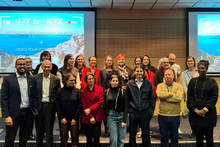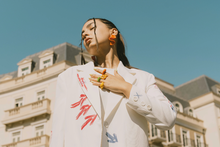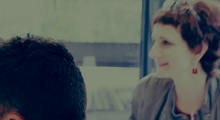A look back at the first Réussites Solidaires: working...

Discover the interview with JC Pieri, KEDGE Alumnus and Director of the documentary Osiligi
In anticipation of the screening of Osiligi at our campus in Marseille, we met with JC Pieri to learn more about him, his background, his time at KEDGE and, most particularly, his documentary!
Hello JC Pieri. Before telling us about your documentary, would you tell us a little bit more about you and your background?
Hello. I’m 33 years old and I discovered the field of filmmaking through another passion of mine, BMX bike riding. I'm a former BMX freestyle professional and that's how I started travelling the world and when my passion for filmmaking, photography, and video was born.
I didn’t study filmmaking, I'm self-taught. In fact, my first calling was to become an estate manager. At that time, filmmaking for me was just a passion and I didn't think it was going to become my career. In fact, the reason why I enrolled at KEDGE was to get a degree in financial management, but after three years I realised that I didn't belong. I also did an internship in a bank which went very badly, confirming that this was not for me.
After that, I decided to continue studying at KEDGE and get a Master degree specialising in sports and event management. At the same time, I started working in event management with one of my best friends and together we organised several events, including many in collaboration with the school.
The entire time I was at KEDGE, I continued to teach myself filmmaking and when I left the school I saw that I could make a living from my passion. So, I asked myself if I should continue in event management because it was working well or if I should live through my passion for photography and video. In the end, I decided to stop what I was doing in the event industry to devote myself to my passion.
You graduated from KEDGE in 2013. What memories do you have of the school, what stands out for you?
Because of my personal situation at the time, I wasn’t able to take full advantage, actually not even at all, of the school and everything else that was available to me during my first three years.
After those first three years, I gradually started to discover the school’s clubs, events, and entire ecosystem. And that's when I understood the value of getting involved in the life of the school, It's the most important thing for me.
From that moment on, I encouraged the clubs to make videos and photos to highlight their projects, and little-by-little, I became known for my skills until I was able to make the photos and videos for the ECRICOME challenges.
To answer your question more accurately, what marked me most at the time was this evolution from no one knowing me to a time when a lot of people knew me because of my passion. I was sort of stuck before that and after I was able to flourish.
What is your favourite memory from your time at KEDGE?
There are two.
The first one is related to the ECRICOME challenge, which is a moment of great pride for me. I took a photograph the first year Marseille won the trophy for the best campus environment. That photo was posted on campus and remained there for years. I wonder if it is still there... It remains a great source of pride for me.
And a second, somewhat funny, memory I have is from my first year at KEDGE. I tried to join the Mars' Eyes Club because it was a group that resonated with me. So I applied but they turned me down, and now, photography, imagery, and video are my profession. It's quite funny, I think.
Osiligi, shot in Kenya, aims to raise awareness of animal rights and their protection. Where did you get the idea to make this film?
I’d been wanting to do wildlife photography for a few years now and the cause was becoming more and more important to me. In 2019, I took a trip to Madagascar that turned my whole perspective upside down. It was a time when I did projects that were meaningful, not just projects for myself or clients. I had already succeeded in highlighting the plight of people and children in Madagascar, and now I wanted to do the same with animals because it fuels my sense of passion.
A friend of mine who is a guide, Valentin Davis offered to take me on a safari with him. I wanted to go with him but wanted to do more than just a "simple" safari. So, I suggested that we make a documentary together and that's what we did. I self-produced the project and spent 13 days with my team in Kenya shooting the film.
Why the title Osiligi? What does it mean?
Osiligi means hope in the Maasai language.
How was the shooting on location? Could you describe a typical day?
In that region, the animals are active mostly at night, very early in the morning at sunrise, and also in the evening before sunset. It was absolutley necessary to leave very (very) early in the morning, 4 - 5 am and work until evening, around 8 pm. The days were long. We barely stopped to eat in the middle of nature. We were also active throughout the entire day because, even though there is less activity in the middle of the day, there are still a lot of animals to see and beautiful things to capture.
After all, 13 days is rather short to make a documentary, so we had to make the best out of our opportunities and be as present as possible while respecting the animals.
We imagine it can be quite particular shooting conditions in the middle of the wild. How did you feel about it?
It was sheer excitement. Some people may be afraid or even apprehensive; however, I’m not afraid of animals because I feel like they understand me and they know that I am not going to hurt them.
Of course, there were times when we had to be extremely careful, but I felt no fear or doubt during the shooting.
To which audience would you recommend Osiligi?
To everyone!
We did sneak previews in Paris and Marseille. In the theatre, there were children aged from 5 years old to adults as old as 80 and everyone loved it. Honestly, regardless of their age, the viewer will understand the problems and intentions of the film.
Finally, if you had to give one piece of advice to KEDGE alumni and students who would like to follow in your footsteps, what would that be?
If you have a passion, follow it.
Don't necessarily go to a school of photography or video because in reality, you don't learn "the real thing" as you do in the field. Today, that's why I created online courses. I teach people the real experience that they would get out in the field. In reality, settings and other “how-to” details can be found on YouTube but the experience in the field is more complicated – there are little details that really make the difference. I also advise you to look towards the people who inspire you to do this kind of work.
In regards to KEDGE, personally, the school brought me a lot. I learned about marketing, how to "talk the talk", speak with people, how to present projects, and most importantly how to network! Take advantage of it.
Also, I think I learned a lot because I took chances, in event management for example. I organised events, I succeeded, and I also made mistakes. It is essential.
And finally, if you want to do my job or a similar job, don't do it for the money, that won't work. Above all, be passionate!






0 Comment
You must be logged in to leave a comment.
No comment